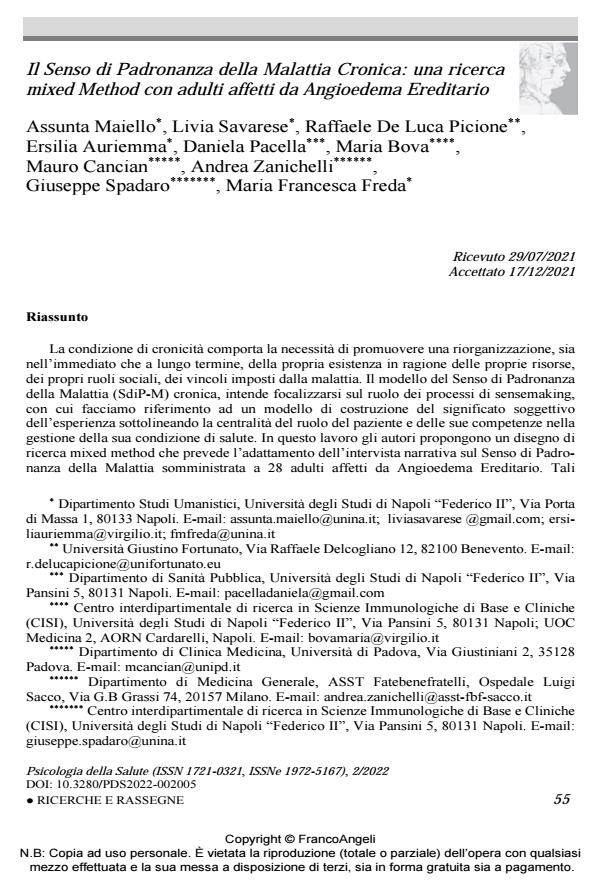The Sense of Grip on Chronic disease: a mixed-method research with adults affected by He-reditary Angioedema
Journal title PSICOLOGIA DELLA SALUTE
Author/s Assunta Maiello, Livia Savarese, Raffaele De Luca Picione, Ersilia Auriemma, Daniela Pacella, Maria Bova, Mauro Cancian, Andrea Zanichelli, Giuseppe Spadaro, Maria Francesca Freda
Publishing Year 2022 Issue 2022/2
Language Italian Pages 25 P. 55-79 File size 311 KB
DOI 10.3280/PDS2022-002005
DOI is like a bar code for intellectual property: to have more infomation
click here
Below, you can see the article first page
If you want to buy this article in PDF format, you can do it, following the instructions to buy download credits

FrancoAngeli is member of Publishers International Linking Association, Inc (PILA), a not-for-profit association which run the CrossRef service enabling links to and from online scholarly content.
The condition of chronicity implies the need of a reorganization of one’s existence, both in the immediate and in the long term, due to the changes in personal resources and social roles and because of the constraints imposed by the disease. The Sense of Grip on Chronic Disease (SdiP-M) model intends to focus on the role of sensemaking processes in the psychological adjustment to illness, emphasizing the patient’s role and his skills in managing his health condition. In this study, the authors propose a mixed method research which implies the adaptation of the narrative interview on the Sense of Grip on chronic Disease. The interview was administered to 28 adults suffering from Hereditary Angioedema and has been analysed with a theory driven approach, aims at exploring the modalities of five narrative functions: temporal articulation, integration of the experience in everyday life, emotion regulation, social support and coping. Through a Multiple Corrispondence Analysis and a cluster analysis, the authors have identified three different Sense of Grip on Disease Profiles, representative of different degrees of flexibility, integration and adjustment to disease. Results suggest that Quality of Life is related to promotion of processes involved in Sense of Grip on Chronic Disease: these processes are relevant for supporting patient and healthcare system engagement.
Keywords: chronic disease, narrative interview, sensemaking process, engagement.
Assunta Maiello, Livia Savarese, Raffaele De Luca Picione, Ersilia Auriemma, Daniela Pacella, Maria Bova, Mauro Cancian, Andrea Zanichelli, Giuseppe Spadaro, Maria Francesca Freda, Il Senso di Padronanza della Malattia Cronica: una ricerca mixed Method con adulti affetti da Angioedema Ereditario in "PSICOLOGIA DELLA SALUTE" 2/2022, pp 55-79, DOI: 10.3280/PDS2022-002005